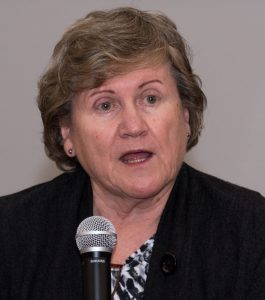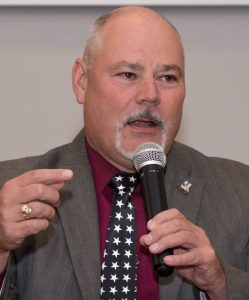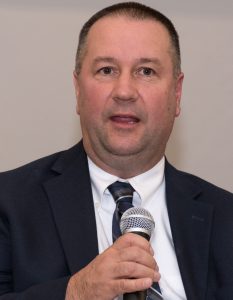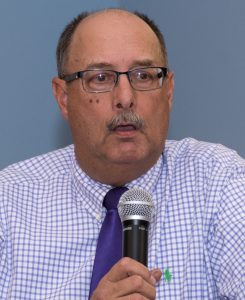WESTFIELD—Residents were able to get their chance to ask questions and hear the views of those running unopposed in this year’s city election during last night’s final candidate forum.
Candidates were asked questions prepared for them by The Westfield News, as well as questions from the residents on hand and others. Candidates, as well as the host of the forum and owner of The Westfield News Patrick Berry, also gave their condolences during the forum in regards to the loss of former Mayor Michael O’Connell, who was also the husband of At-Large Councilor Cindy Harris. O’Connell died earlier in the day after an illness.
Those running unopposed were Mayor Brian Sullivan, Ward One Councilor Mary Ann Babinski, Ward Two Councilor Ralph Figy and Ward Six Councilor Bill Onyski.
The candidates were asked questions about their own wards, as well as issues within the city itself that concerned them and what they would be doing going forward. The format was different than previous forums this year, with a more open and informal session being provided.

Ward 1 City Councilor Mary Ann Babinski responds to a question during Wednesday night’s final candidate forum for those unopposed candidates. (Photo by Lynn Boscher)
The first question was given to Babinski, who was asked about how she balances the large area that her ward covers and that is available for larger industrial businesses to expand, while also giving residents the ability to live in a more remote section of the city.
“It is a very difficult question to answer or even to solve because we have to have balance,” she said.
Babinski said that the area was agricultural for many years, which has to be considered. In addition, she noted natural resources like the Barnes Aquifer that are in the area, which provides drinking water for the city and has had issues with contamination from perfluorinated compounds, that must also be protected.
Babinski also said that a plan should be had in regards to developments.
“We have to have a good plan, have to know we’re paying close attention to the kinds of businesses we bring in,” she said. “We have to be aware of it, may have to make the hard choices and realize there may be something we can’t do.”

Mayor Brian Sullivan addresses the audience during Wednesday night’s final candidate forum for those unopposed candidates. (Photo by Lynn Boscher)
The next question was directed to Sullivan, who was asked about the Mayor’s briefings before City Council meetings in order to improve communications and whether it has been effective.
Sullivan felt that it has been, both because it creates a dialogue between him and the council and because of the additional exposure it provides for people.
“The biggest benefit is that it’s televised,” Sullivan said, noting that people have told him they appreciate the briefing. He also said that it has prompted people to go to subcommittee meetings.
“A lot of people are for transparency in government and unfortunately government backed itself into the corner with that,” he said.
However, with the briefing and other steps, Sullivan believes they have improved this in Westfield.
“I do think it’s a benefit for the council, myself and the public,” he said.

Ward 6 City Councilor William Onyski shares his thoughts during Wednesday night’s final candidate forum for those unopposed candidates. (Photo by Lynn Boscher)
The third question on the evening was asked of Onyski. He was asked about balancing the needs of business expansion, like that of Boise Cascade, with neighbors’ concerns.
“Boise Cascade, in my mind, is a great success story,” Onyski said.
According to Onyski, the Union Street-based business wanted to expand their operations, which included lumber loading, to 24-hour status.
This request brought concerns from neighbors about items such as noise and lighting, especially at night, and over a large land mass.
Onyski said that he met with Boise Cascade and the neighbors and eventually had several walk-throughs of the property with the parties. From there, he said that they “hammered out a compromise,” which he believes benefited both sides.
“It is possible to get together and put together a solution and we did in that aspect,” he said.
Up next, Figy was asked a question about his ward, Ward two, and the future of downtown that he is helping with.

Ward 2 City Councilor Ralph Figy speaks to the crowd during Wednesday night’s final candidate forum for those unopposed candidates. (Photo by Lynn Boscher)
Figy admitted that to this point, downtown has not been a point of emphasis for him.
“Downtown has not been one of my points of emphasis,” he said.
He voiced concerns with the fact that the Business Improvement District was disbanded, and there was nothing to replace it.
“Nothing was put in place, everyone made pie in the sky promises,” he said.
However, he said that what has occurred downtown with Westfield on Weekends and events such as the Rag Shag Parade, the Pumpkinfest and small businesses opening up, has been good.
Something that he wanted to see developed in the area though, was a 55-and-older assisted living facility.
“I would love to see an assisted living 55-and-older facility built next to a medical building,” he said.
He also said that he would like to see improved foot traffic, which could occur with more development.
Figy was then asked a question from the public about apartments, especially in relation to college students.
Figy said that there have been issues with students and the city has attempted to deal with it through the creation of an ordinance, but that has gotten some negative feedback from the courts.
“We’ve got some issues, we’ve tried to deal with college kids, passed an ordinance for nuisance housing,” Figy said. “But the court’s not happy with that so we have to retool that.”
A question from one of the residents about social media was then asked, which was put forth to all the candidates. The resident asked if social media, which has become “a buzz,” is “good or just noise.”
“It’s the noise I love to hear, I think it’s a good thing,” Babinski said, adding that there is bad that comes with the good.
“What we have to expect is there are people who have opinions and want to get involved with what’s going on,” she said.
She said that she follows the conversations on social media and that it would be a mistake not to. Also, that the conversations there could lead to knowing about problems that are out in the city.
“Someone said we need to have solutions,” Babinski said. “First you have to recognize the problems, have dialogue about it and find out if you can have a solution.”
For Sullivan, he said that social media will continue to be around and that it should be accepted.
“Social media is not going away, so you have to accept it,” he said. “And its coming from the top down, all the way from the president to local government.”
Sullivan said that he would prefer people come to meetings, such as the candidate forum, and ask questions. In addition, he said that it can be difficult to engage in the discussions on social media because “it’s a no-win problem.”
However, Sullivan said that he would continue to try through social media.
For Onyski, social media is also good and bad.
“Social media has its good and bad elements,” he said. “Good is instant news, instant feedback, which is also some of the bad.”
Onyski spoke about the problem of bullying over social media, particularly in schools. He compared this to Westfield’s presence on social media.
“And with some of the social media here in Westfield, it’s similar,” he said.
But Onyski believes it does not need to be this way. He also said that in lieu of discussions through such channels, he would like to talk with people in person.
“I would love to have conversations with anyone out here, look them in the eye and give a solution,” he said. “I think that’s where the solution and the back-and-forth really help.”
For Figy, he said that social media has the problem of not allowing there to be the personal physical connection when talking.
“You don’t have the intimate contact, the one-to-one, you can’t read that person’s body language,” he said.
Figy admitted that he does not engage in social media often.
“First time I did it was to announce the continuation of the medical zone public hearing,” he said, referring to a still-pending zoning ordinance change.
“Much rather do it face-to-face than through a computer,” he added.
A resident then asked about the former Ashley Street School and what could happen in the next two years to that property.
Sullivan provided his vision for the school to the residents. He started by saying he “would love” to have a school there.
“I think I can build a 400-person school on Ashley Street and have it fit in the footprint,” he said, adding that it could also keep with Article 97 protections upheld by the Supreme Judicial Court.
He said that a school should be there, in that location, providing a local and fifth elementary school to the city, and one that can house newer technology, while also giving a closer option for students.
“Almost 94 percent of those students would walk, just two to three busses,” he said. “Keep the local school.”
Figy said that he would like to see a replica of the previous school at the site and that a school there would be beneficial. He added that Westfield has a need for more technologically advanced schools.
He relayed a story about how his daughter, who, when she attended Abner Gibbs School, had a neurological problem that made writing difficult. His daughter needed a computer for this condition but could not have one at Abner Gibbs.
“We couldn’t get computer for her in school because there were no outlets,” he said, noting the lack of technology.
A question was also asked about the redistricting of North Middle School and South Middle School.
“A great solution for a problem that exists and a great choice,” Onyski said. “As far as it will affect each school, I don’t think it will have a negative effect.”
“If you get a good staff together and great kids, you get a great education,” Babinski said, citing her own experiences as an educator.
Sullivan said that as Chairman of the School Committee, the move was related to the Boys and Girls Club. By putting seventh and eighth grade students closer to there, there was an additional outlet for them.
“How important for those seventh and eighth graders to go there, it’s huge,” he said.
A question was also brought forth by Tina Gorman, Executive Director of the Westfield Council on Aging, about the non-binding ballot question for extending the mayor’s term from two years to four years.
Figy said the proposal was his idea, with it being hashed out through the Legislative and Ordinance sub-committee of City Council and through public comments. The proposal was initially to extend both city council and mayor terms, but Figy said the public only supported the mayor’s extension.
“It was our idea to put onto the ballot a non-binding referendum just to gage the public opinion,” Figy said of the question.
Figy said that this would be beneficial because it would provide whoever is mayor to have more time to complete ideas.
As Figy ran out of time to comment on the matter, Onyski took the opportunity to offer his own time on the issue to Figy, forgoing some time to comment and showing a moment of camaraderie.
Figy continued, adding that if the term is extended, the plan would be to have the mayoral election run only when a presidential election is not running, in order to induce better voter turnout.
Sullivan, who is current mayor, said that he wanted to be out of the discussion related to the referendum overall.
“I have respectfully stayed out of the conversation and I will tell you why,” he said. “I have my opinions, my own opinions, and as a sitting mayor I don’t think my opinion should impact how you vote.”
Babinski said that this is an additional chance for people to get out and vote.
“I’m hoping that this election gets a good turnout, if for nothing else than that referendum,” she said. “I would like to get or see a lot of people state what they feel about that.”
Figy was also asked from Gorman about the medical district zone, which he also proposed.
Figy noted that representatives from Baystate Noble Hospital had approached him after they attempted a renovation that had to go before the Zoning Board of Appeals, which Figy said is not the appropriate body to hear such requests. Instead, he suggested that the plans be put in front of the Planning Board.
He created the motion for city council, along with Ward Three Councilor Andrew Surprise he said, and it was brought out to public hearings. The ordinance is still in the process of those hearings.
Babinski though, spoke about the residents’ concerns for the proposal.
“They’re worried about by-right [use] and wanted more growth and plans of what the hospital wanted to do,” Babinski said.
She also said that they want the process to have special permits in place for residents to have a voice and that if rules are not followed, that those who do not are held responsible.
“You can promise people anything but you better follow through,” she said.
Onyski agreed with Babinski about enforcement, but also agreed with Figy that the Zoning Board of Appeals was not the appropriate place for changes for the hospital to go to.
Economic Advancement Officer Joe Mitchell also asked the candidates what their greatest achievements were over their term in office.
Onyski said that communication with residents was key.
“Residents call me, email me, I worked to solve a lot of quality of life issues,” he said.
For Figy, he cited the bus stop issues on Main Street and other areas that he helped to solve, including a temporary bus stop that was placed in front of Stop and Shop that became permanent.
Another was the Westfield Senior Center, which he helped get bonded and the creation of sidewalks in his ward.
Babinski said that she feels it has been her responsiveness to her constituents.
“I think it’s because I try to be very responsive to people who reach out to me,” she said.
“We think of our constituents as customers and give the best that we can,” Babinski added.
She said that she worked to educate residents on the process of the government and what they could do.
“I think that the people want me and I promised them that I would be a voice for them, but more importantly want them to exercise their voice,” Babinski said.
For Sullivan, he felt that he accomplished what he set out to do.
“Biggest thing I would say is I stuck to what I said I would do,” he said.
In addition, he said that he meets with notable figures in the city regularly, such as Westfield State University President Ramon Torrecilha, Barnes Regional Airport Manager Eric Billowitz and others.
Also, he noted the zero percent tax increase from last year and the recent proposal for a roughly $1.6 million budget decrease still within city council.
Onyski was then asked by Berry about his finding of funds for the Columbia Greenway through Community Preservation Association (CPA) grant funds, which helped cut $250,000 from the city’s budget, in spite of the Greenway not going through his ward.
“I care about all of Westfield,” Onyski said. “The votes I take are for all of Westfield, not just ward six.”
He added that it was a risk, but that more of this can occur since the CPA money can be used for projects for recreation, older buildings and open space.
“It’s the taxpayer’s money. I think it should go to taxpayer requirements and projects,” Onyski said.
Berry then asked Babinski, who is retired from her previous full-time employment, about how this impacts her service as city councilor, especially compared to city councilors not in her position.
“It is a lot of work. I have a lot of respect for people that aren’t in the same position we’re in,” Babinski said.
She said while there is more time, it does not last long.
“Yes, it gives you a little more time but I will tell you how quickly that time fills up,” she said.

